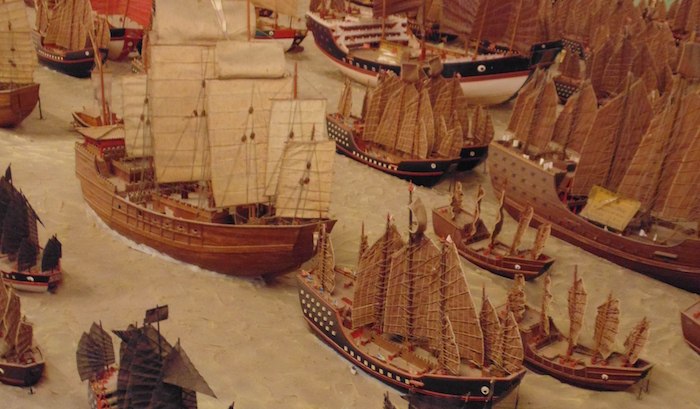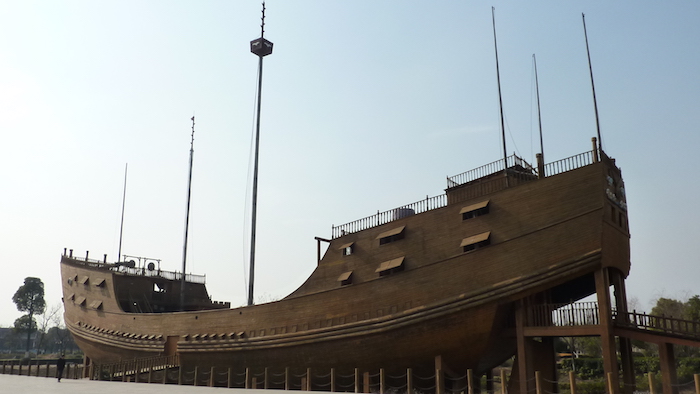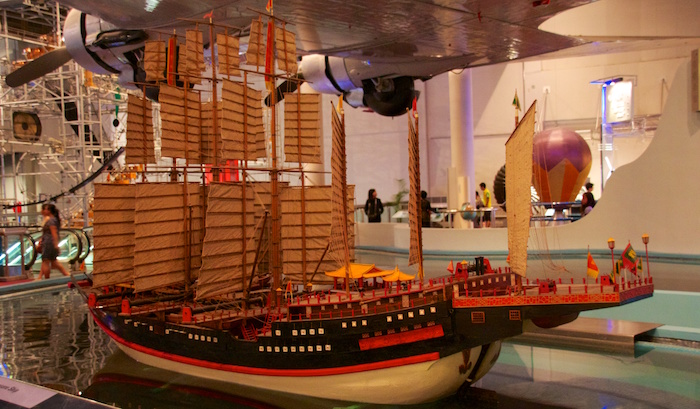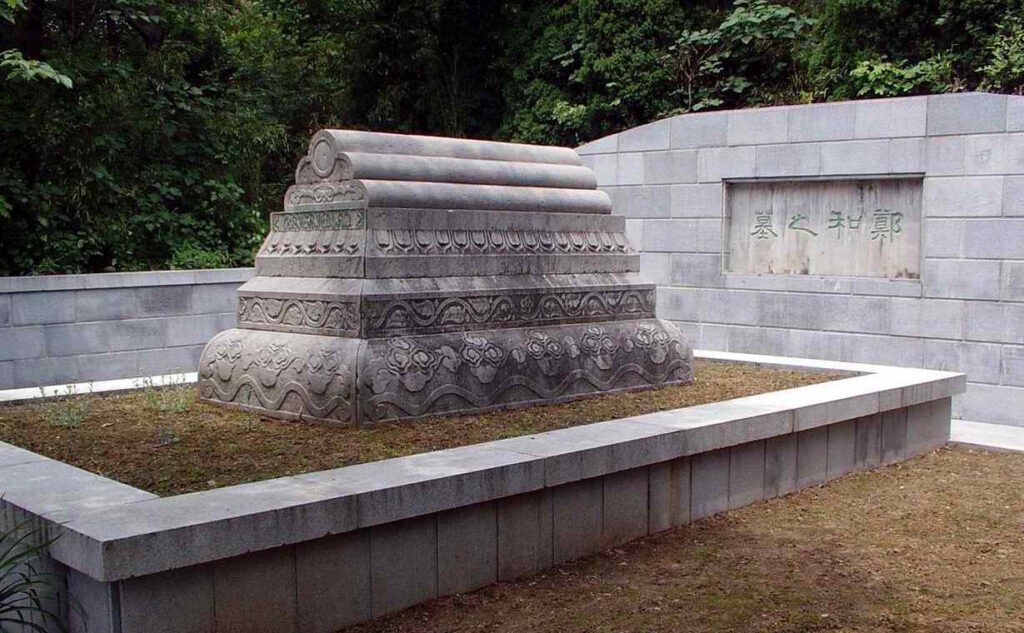Zheng He was a diplomat/explorer/admiral for the Ming dynasty of China. In 1410, he felt compelled to invade the far-off island of Ceylon (modern Sri Lanka) and overthrow the king of Kotte. At the time, few Ceylonese people had even heard of distant China. Nonetheless, a fleet of enormous Chinese warships came from out of the blue to land thousands of soldiers, overwhelm the island’s defenses, and then leave as suddenly as they’d come. It must have felt like an alien invasion. Zheng He’s expedition to Ceylon makes great inspiration for RPG adventures precisely because of its sudden out-of-the-blue-ness. It shows an interesting way to take an established campaign, unexpectedly insert an invasion plot, then end the plot before it overstays its welcome.
This post is brought to you by beloved Patreon backer Colin Wixted. Thanks for helping keep the lights on! If you want to help keep this blog going alongside Colin, head over to the Patreon page – and thank you!

Zheng He was a eunuch originally in the service of the uncle of the second emperor of the Ming dynasty. Zheng helped his master overthrow the master’s nephew and become the third Ming emperor. As a reward for skillful service, Zheng was assigned new duties as the admiral of a treasure fleet the new emperor wished to send to the ports of Southeast Asia and the Indian Ocean. The fleet was enormous, boasting about 60 of the largest wooden vessels ever constructed, accompanied by around 200 smaller ships, and crewed by a total of 28,000 sailors, mostly professional soldiers. In terms of weight of wood and number of men, Zheng He’s treasure fleet was probably comparable to the combined totals of both sides at the Battle of Trafalgar four hundred years later.
The purpose of Zheng He’s fleet was the unique product of the court that sent him. It wasn’t exploration; these waters were already familiar to Chinese merchants. Nor was it conquest, though they did a little of that along the way. Nor was it to conduct trade. Rather, Zheng He’s purpose was to force the states of the Indian Ocean into the Chinese tribute system. Because China saw itself as the center of the world and the pre-eminent power under heaven, it expected foreign nations to send ambassadors and gifts to the Ming court. In exchange for this tribute, foreign courts received gifts of their own and official recognition by the Ming as rightful rulers.
Zheng’s job was to show up in foreign ports and say, “I’m a representative of the Son of Heaven, whom you may or may not have heard of. He sends you these lavish gifts of silk and brocade. In return, please send aboard princely gifts of your own and a noble ambassador or three. I will bring your ambassadors back the next time I’m passing by this way. If you don’t want to send tribute to the Son of Heaven, my soldiers – who may outnumber your entire army – will make you do it.” Zheng He undertook sevensuch voyages, traveling as far west as Kenya. Unsurprisingly, the whole venture was fabulously expensive and was scrapped after 28 years, never to be resumed.

Image credit: Vmenkov. Released under a CC BY-SA 3.0 license.
In 1406, on his first voyage, Zheng He stopped in Ceylon, the island that is today the nation of Sri Lanka. At the time, much of Ceylon was ruled by the Kingdom of Kotte. Kotte was a Buddhist state whose rulers were at odds with the coastal states of the nearby Indian mainland. These Hindu and Muslim nations were enthusiastic participants in an oceanic trade dominated by Muslim merchants. Fervently Buddhist Kotte wasn’t part of that world, and instead sponsored pirates to prey upon it. When Zheng arrived in Kotte, he quickly realized the king was hostile and wished to do him harm. We can only speculate as to why. Maybe because the Hindu and Muslim states of the Indian Ocean that Kotte feuded with were complying with Zheng’s mission, and if they were doing A, the king of Kotte had to do B? We can’t know for sure. In any case, Zheng and his fleet continued on their way without enrolling Kotte in the tribute system.
Zheng He returned to Kotte on his third voyage, probably in 1410. The king, Alakeshvara, saw this as an opportunity. He provoked Zheng, probably with something along the lines of, “If you want me to send tribute to your emperor, why don’t you come over here and make me?” So Zheng disembarked and marched inland. Then Alakeshvara sprang his trap! He sent his army down to the beach where the treasure fleet lay at anchor, and he barricaded the narrow mountain roads between Zheng and the fleet. He issued an ultimatum: “You cannot reach your fleet in time to save it. Send me gold and silver or I will loot your ships.”
Zheng turned Alakeshvara’s strategy on its head. He didn’t rush to rescue his fleet. Instead, he marched inland, towards the capital of Kotte. He knew Kotte’s army was down on the beach, so the capital was undefended. He breached the city walls by surprise and captured King Alakeshvara, the royal family, and the court. The army of Kotte raced from the beach without touching the ships. They had to rescue their king! But Zheng held the defensible position inside the walls, defeated the army of Kotte, and left Ceylon with the king and his imprisoned court in tow.

Image credit: Mike Peel (mikepeel.net). Released under a CC BY-SA 4.0 license.
In the centuries since, a legend has sprung up that Zheng He was also after Ceylon’s holiest relic: the tooth of the Buddha. There’s nothing in the contemporaneous sources to suggest that was the case. Nor is it likely that Zheng would want to desecrate the relic. He was born Muslim, but by the time of his expeditions, Zheng had converted to Buddhism. (He was also a follower of the Chinese sea goddess Mazu.) Zheng He trying to steal the tooth of the Buddha is a cool story and a fun wrinkle in an RPG adventure, but it’s probably just a story.
The Chinese attack on Kotte had major political ramifications in the kingdom. Alakeshvara was a usurper. He was from a family that had intermarried with the original kings of Kotte. Alakeshvara began his reign as the de-facto ruler under a puppet king, and later seized the throne outright. When Alakeshvara, his family, and his courtiers were taken aboard Zheng’s treasure ships, presumably never to return, the former royal family retook the throne.
When Zheng returned to China, the emperor pardoned Alakeshvara. The ex-king of Kotte was just a barbarian, and he didn’t know about the Mandate of Heaven. Still, for attacking a Chinese envoy, Alakeshvara could not regain his crown. Instead, the emperor ordered the Imperial bureaucracy to select another from Alakeshvara’s family to become king. When the former court of Kotte finally returned to Ceylon, neither Alakeshvara nor his Ming-appointed successor were strong enough to retake the throne from the former-and-current royal family currently occupying it. So when Zheng He arrested Alakeshvara, he was effectively transferring power between dynasties and setting Kotte up for a three-way political showdown when Alakeshvara returned.

I love this whole story. Ceylon wasn’t really plugged into the Indian Ocean trade network, so most people on the island probably didn’t even know that China existed. Then out of absolutely nowhere, thousands of troops who might as well be from an alien planet are marching through your fields, arresting your king, and then skedaddling, leaving the family of a former king in charge. It’s as if here in 2021, Martians showed up in Washington, D.C. declared that America once more belonged to King George III, and then vanished.
On the Molten Sulfur Blog, I try to provide content you can use in the campaign you’re already running. Too much of what’s out there in the RPG internet is “wouldn’t it be fun to run a campaign about X?” I figure you’ve probably already got a campaign you like just fine. And that’s what’s so great about this Zheng He business! It shows us how to drop a strong band of utterly unpredictable outsiders into a pre-existing campaign, whether they be aliens, demons porting in from Hell, or the 1918 Czech Legion. Give them a clear purpose, preferably one that ties into something about the setting your players enjoy and care about. Run a short adventure about them pursuing their desired goal. Maybe fold in a secondary, more colorful goal, like stealing the tooth of the Buddha. Keep the adventure short; you don’t want half the campaign to be about this unexpected development. Then have the invaders leave just as suddenly as they arrived. This gives the PCs a chance to put the pieces back together and influence what the setting looks like now.
–
Source: Zheng He: China and the Oceans in the Early Ming Dynasty, 1405-1433 by Edward L. Dreyer (2007)






